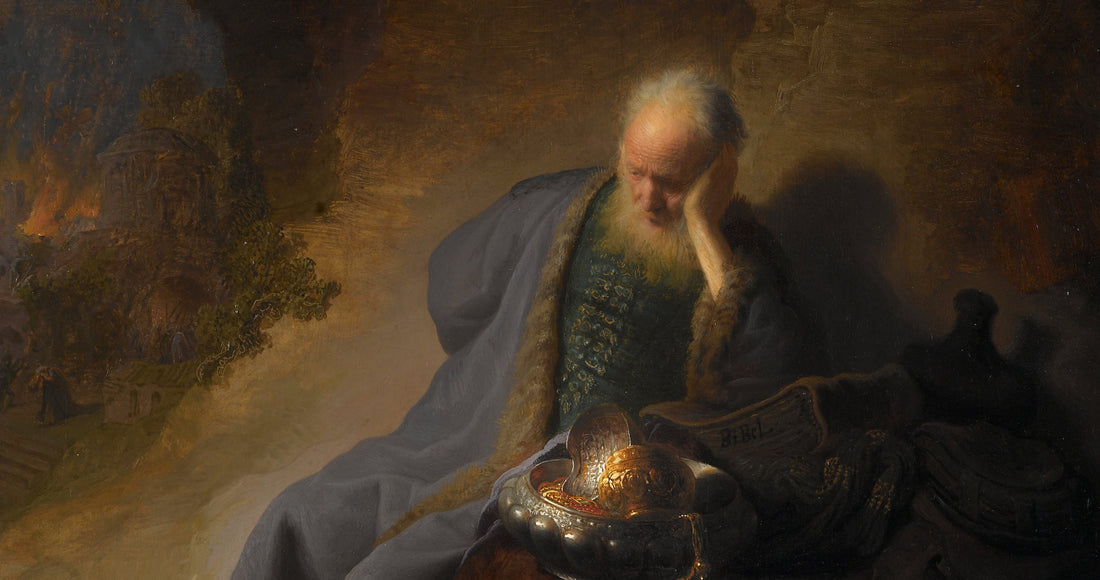
Meet the Messengers: Jeremiah, Prophet of Hope
Thomas SmithIf there was ever a man that would have every reason to be without hope it would be the prophet Jeremiah. He’s called “the weeping prophet” for a reason.
(This is the third part of a series where Thomas Smith takes a closer look at six prophets from the Old Testament, God’s messengers. Missed the previous posts? Click here to catch up!)
A Prophet of Hope
Called by God when just a teenager (Jeremiah 1:5-7), our prophet was roundly rejected and maligned by his own people, forsaken by his family, and even forbidden from marrying (Jeremiah 16:1-2). He would remain in Jerusalem to the bitter end, witnessing the fiery destruction of the Temple and the public slaughter of the Davidic line. He earned the right to write Lamentations.
And yet, in spite of all of this, he remains for me a prophet of hopefulness. Jeremiah understood that hope has little to do with external circumstances and everything to do with God, the true hope of Israel (Jeremiah 14:8).
At his darkest hour, as Babylon surrounded his starving city, and while imprisoned by his fellow Jews, Jeremiah did something amazing. He bought a tract of land from his cousin in Anathoth, a parcel already conquered and leveled by the Babylonian armies.
In modern parlance, he put his money where his mouth was. He had already promised the people that after a seventy-year exile for their sins, they would return to the land again, settling their ancestral cities. Now his actions made his prophecies sure.
To the gathered witnesses, he placed the signed deed before the people and sealed it in an earthenware jar as a kind of time capsule, declaring, “houses and fields and vineyards shall again be bought in this land” (Jeremiah 32:15). While the cities’ walls were being breached, he surrounded the little remnant of Jews with a fortress of hope. Even in his Lamentations, he could say:
“But this I call to mind, and therefore I have hope: the steadfast love of the Lord never ceases, his mercies never come to an end; they are new every morning; great is your faithfulness. The Lord is my portion, says my soul, therefore I will hope in him.”
Lamentations 3:21-23
Speaking through his prophet, the Lord declared:
“For I know the plans I have for you, says the LORD, plans for welfare and not for evil, to give you a future and a hope.”
Jeremiah 29:11
Discover the Messages the Prophets Have for You
The Prophets: Messengers of God’s Mercy gives you a deeper understanding of who the prophets were and their role in God’s plan.
Imitating Jeremiah
When we look around our world today, it sometimes seems there is little reason to hope. And yet, difficult times are the very moments we must “lean into” the virtue of hope, given to each of us at baptism.
Echoing the Lord’s promise to Jeremiah, Pope Emeritus Benedict said:
“Here too we see as a distinguishing mark of Christians the fact that they have a future: it is not that they know the details of what awaits them, but they know in general terms that their life will not end in emptiness. Only when the future is certain as a positive reality does it become possible to live the present as well.”
Spes Salvi, 2
Finally, this hope isn’t for our own consolation and strength. It is meant to be shared! Like Jeremiah we must proclaim this living hope in our word and deeds! I love how St. Peter puts it:
“Always be prepared to make a defense to any one who calls you to account for the hope that is in you, yet do it with gentleness and reverence.”
1 Peter 3:15
What are some of the concrete ways you can be a herald of hope to those around you?
Discover the Messages the Prophets Have for You
The Prophets: Messengers of God’s Mercy gives you a deeper understanding of who the prophets were and their role in God’s plan.
You May Also Like:
Prophets: Messengers of God’s Mercy
How We Participate in Divine Mercy
Divine Mercy
Thomas Smith is the co-author of Wisdom: God’s Vision for Life, Revelation: The Kingdom Yet to Come and The Prophets: Messengers of God’s Mercy. He is an international presenter for The Great Adventure Bible Timeline. Bringing a wealth of experience and insight on the Word of God to audiences across the U.S., Thomas is a repeat guest on EWTN and Catholic radio as well as a sought after parish mission and conference speaker. Thomas Smith has taught as an adjunct professor at the St. Francis School of Theology in Denver, and is the former Director of the Denver Catholic Biblical School and the Denver Catechetical School. He lives on his family ranch in southeastern Idaho and writes for his website www.gen215.org.
This article was first posted on The Great Adventure Blog, Ascension Blog’s former home, October 7, 2014. To learn more about The Great Adventure Bible study click below.
Featured image, Jeremiah Lamenting the Destruction of Jerusalem (1630), by Rembrandt sourced from Wikimedia Commons